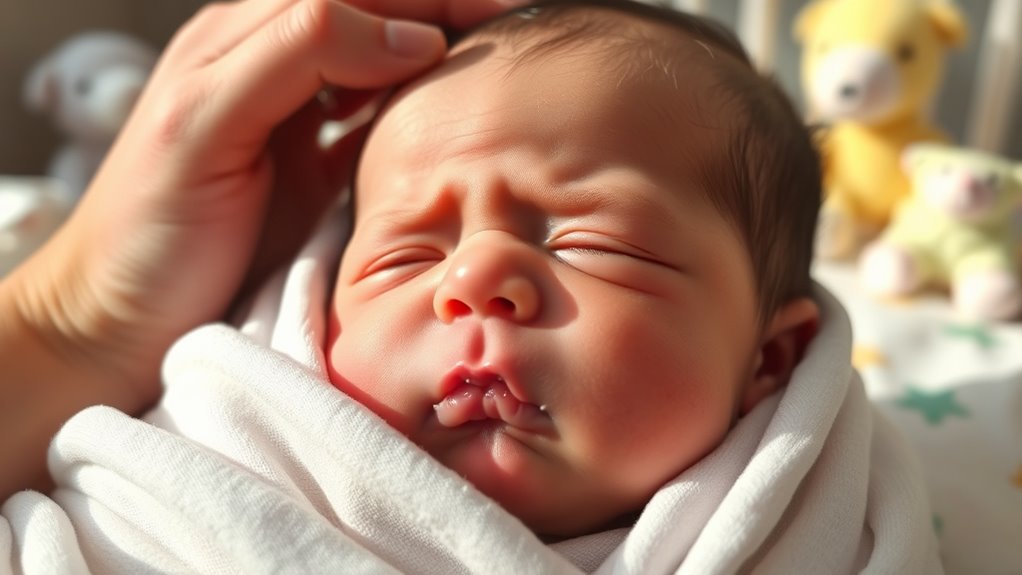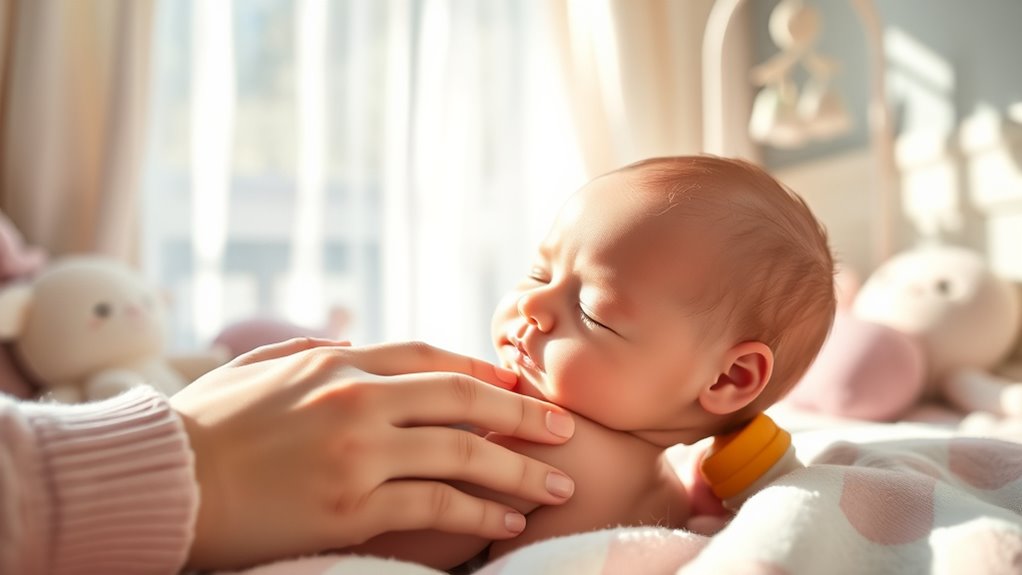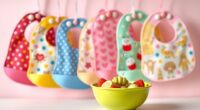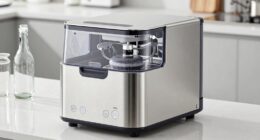To handle baby hiccups effectively, try burping your little one during and after feedings to relieve pressure. Feed them smaller amounts slowly to minimize air swallowing and avoid overfeeding. Keep your baby upright after meals and allow them to suck on a pacifier, which can help relax their diaphragm. If hiccups persist or are accompanied by fussiness, consult your pediatrician for further advice. Discover additional tips and strategies for managing this common issue.
Key Takeaways
- Feed your baby smaller amounts slowly to reduce the chances of hiccups.
- Regularly burp your baby during and after feeding to relieve stomach pressure.
- Keep your baby upright for at least 30 minutes after meals to aid digestion.
- Offer a pacifier for sucking, which may help relax the diaphragm.
- If hiccups persist for hours or are accompanied by fussiness, consult your pediatrician.

Have you ever wondered why your baby gets hiccups? Hiccups are those rhythmic jerks that can seem puzzling, but they’re quite common in newborns. They happen due to spasms of the diaphragm, often irritated during feeding. You might even notice these little hiccup sessions starting before your baby is born. While hiccups can be alarming at first, they typically aren’t a cause for concern and usually clear up within a few minutes.
Identifying what triggers your baby’s hiccups can help you manage them better. Overfeeding or feeding too quickly often leads to hiccups, especially if your baby swallows air while eating. Keep in mind that sudden temperature changes in their stomach can also be a culprit. If your baby has frequent hiccups, it could be related to gastroesophageal reflux disease (GERD), but that’s something to discuss with your pediatrician if you’re worried. The position your baby is in after feeding can contribute as well; lying flat may increase the likelihood of hiccups.
To prevent hiccups, try some simple feeding techniques. Offer smaller amounts and feed slowly, giving your baby time to digest. Regular burping during and after meals can relieve pressure in the stomach, helping to minimize hiccups. It’s also beneficial to keep your little one upright after feeding to aid digestion. Avoid overstimulating your baby with high-energy activities just after meals, as this can upset their tummy and lead to hiccups.
When your baby does get hiccups, there are a few strategies you can use to help. Burping can be effective in relieving the pressure causing the hiccups. You might also find that letting your baby suck on a pacifier helps relax their diaphragm. Sometimes, the best approach is to simply wait it out, as hiccups often resolve on their own. Gentle rocking or soothing can help calm your baby, and changing their position might provide some relief as well.
If you notice persistent hiccups lasting for hours or if they’re accompanied by other symptoms like fussiness or spitting up, it’s important to consult your pediatrician. Monitoring your baby’s growth and weight can also help you identify any underlying issues.
Frequently Asked Questions
Are Baby Hiccups a Sign of Any Underlying Health Issues?
Baby hiccups are usually harmless, but they can sometimes indicate underlying health issues.
If your baby frequently hiccups, especially if it’s accompanied by symptoms like spitting up, coughing, or irritability, it might be a sign of gastroesophageal reflux disease (GERD).
Always trust your instincts—if you notice your baby seems distressed or if the hiccups persist, consult your pediatrician to rule out any potential concerns.
Your baby’s comfort and health are top priorities!
Can Hiccups Cause Discomfort or Pain for My Baby?
Hiccups in babies are like tiny hiccuping fireworks—harmless and fleeting. They usually don’t cause discomfort or pain.
If your baby seems uncomfortable during hiccups, it might be due to something else, like reflux, not the hiccups themselves. Most babies can sleep right through them without a fuss.
At What Age Do Babies Typically Stop Getting Hiccups?
Typically, babies start to hiccup less frequently by around 6 months of age.
By the time they reach 9 months, you might notice they’re still hiccuping, but it won’t happen as often.
Most little ones stop hiccuping regularly by their first birthday.
Remember, hiccups are a normal part of their development, so you don’t need to worry too much.
Just relax and let it run its course; they usually resolve on their own.
Are There Any Foods That Trigger Hiccups in Babies?
Certain foods can indeed trigger hiccups in babies.
If you introduce cold milk followed by warm foods, the sudden temperature change might cause hiccups. Feeding too quickly or offering high-volume meals can lead to overfeeding, which often results in hiccups.
Additionally, foods that produce gas or are spicy could irritate their diaphragm. To minimize this, try feeding smaller amounts and monitor how your baby reacts to different foods.
Should I Be Concerned About Frequent Hiccups in My Newborn?
Imagine your tiny bundle of joy, hiccuping softly like a little drumbeat.
It’s common for newborns to have frequent hiccups, and you usually don’t need to worry. They often stem from normal reflexes or feeding issues.
However, keep an eye out for signs like discomfort or spitting up. If hiccups persist for hours, or if you’re concerned, it’s always best to consult your pediatrician for peace of mind.
Conclusion
In the grand scheme of parenthood, baby hiccups might feel like a pesky glitch in your little one’s programming, much like dial-up internet in a world of fiber optics. But don’t fret! With a few gentle techniques, you can soothe those hiccups and keep your baby comfortable. Remember, this is just a small phase in their journey. Embrace these moments, and soon enough, you’ll both be laughing about it over a cup of coffee in the future.









